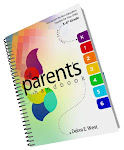Friday, December 31, 2010
Thursday, December 30, 2010
How To Get The Best Education Possible: Tip #73
Posted by Unknown at 2:00 PM 0 comments
Labels: How to Get the Best Education Possible for Your Child, Tips for parents
Wednesday, December 29, 2010
How To Get The Best Education Possible: Tip #72
Posted by Unknown at 2:00 PM 0 comments
Labels: How to Get the Best Education Possible for Your Child, Tips for parents
Tuesday, December 28, 2010
How To Get The Best Education Possible: Tip #71
Posted by Unknown at 2:00 PM 0 comments
Labels: How to Get the Best Education Possible for Your Child, Tips for parents
Monday, December 27, 2010
How To Get The Best Education Possible: Tip #71
Posted by Unknown at 11:09 AM 0 comments
Labels: How to Get the Best Education Possible for Your Child, Tips for parents
Saturday, December 25, 2010
SEASON GREETINGS!
Posted by Unknown at 12:00 AM 0 comments
Labels: How to Get the Best Education Possible for Your Child
Thursday, December 23, 2010
Spreading Some Holiday Cheer
Posted by Unknown at 2:00 PM 0 comments
Labels: Tips for parents
Tuesday, December 21, 2010
Wish List for Older Children
Posted by Unknown at 2:00 PM 0 comments
Labels: Tips for parents
Monday, December 20, 2010
What Makes an Effective Teacher?
Posted by Unknown at 2:02 PM 1 comments
Labels: How to Get the Best Education Possible for Your Child, Teachers
Sunday, December 19, 2010
Get Involved In Your Child's Education
Posted by Unknown at 2:00 PM 0 comments
Labels: How to Get the Best Education Possible for Your Child, Tips for parents
Saturday, December 18, 2010
Healthy Breakfast Sandwiches
Posted by Unknown at 2:00 PM 1 comments
Labels: Health and the family, Tips for parents
Friday, December 17, 2010
How To Get The Best Education Possible: Tip #70
1. Hand sanitizer
Posted by Unknown at 2:00 PM 0 comments
Labels: How to Get the Best Education Possible for Your Child, Tips for parents
Thursday, December 16, 2010
How To Get The Best Education Possible: Tip #69
Posted by Unknown at 2:00 PM 0 comments
Labels: How to Get the Best Education Possible for Your Child, Tips for parents
Wednesday, December 15, 2010
How To Get The Best Education Possible: Tip #68
Posted by Unknown at 2:00 PM 0 comments
Labels: How to Get the Best Education Possible for Your Child, Tips for parents
Tuesday, December 14, 2010
How To Get The Best Education Possible: Tip #67
Posted by Unknown at 2:00 PM 0 comments
Labels: How to Get the Best Education Possible for Your Child, Tips for parents
Monday, December 13, 2010
How To Get The Best Education Possible: Tip #66
Posted by Unknown at 2:00 PM 0 comments
Labels: How to Get the Best Education Possible for Your Child, Tips for parents
Sunday, December 12, 2010
10 Ways to Save on the Holidays
Posted by Unknown at 2:00 PM 0 comments
Labels: Tips for parents, tips for women
Saturday, December 11, 2010
How Healthy are Avocados?
Posted by Unknown at 2:00 PM 0 comments
Labels: Health and the family
Friday, December 10, 2010
How To Get The Best Education Possible: Tip #65
Posted by Unknown at 2:00 PM 0 comments
Labels: How to Get the Best Education Possible for Your Child, Tips for parents
Thursday, December 9, 2010
How To Get The Best Education Possible: Tip #64
Posted by Unknown at 2:00 PM 0 comments
Labels: How to Get the Best Education Possible for Your Child, Tips for parents
Wednesday, December 8, 2010
How To Get The Best Education Possible: Tip #63
Posted by Unknown at 2:00 PM 0 comments
Labels: How to Get the Best Education Possible for Your Child, Tips for parents
Tuesday, December 7, 2010
How To Get The Best Education Possible: Tip #62
It is very important for intrapersonal or self smart children to learn to work cooperatively with others, take up a sports team and get physical exercise, learn an instrument or join a choir, read books of interest, volunteer to help someone or a cause, or take a hike in nature with family or friends. To find out more information on the intrapersonal or self smart child read, "You're Smarter Than You Think," by Thomas Armstrong, PhD. For ideas on how to get involved in your child's education purchase my book,"A Parent's Handbook: How to Get the Best Education Possible for Your Child K-6 Grades. Order the book at http://www.besteducationpossible.com/ .
Posted by Unknown at 2:00 PM 0 comments
Labels: How to Get the Best Education Possible for Your Child, Tips for parents
Monday, December 6, 2010
How To Get The Best Education Possible: Tip #61
Posted by Unknown at 2:00 PM 0 comments
Labels: How to Get the Best Education Possible for Your Child, Tips for parents
Sunday, December 5, 2010
Child Nutrition Act
Posted by Unknown at 12:00 PM 1 comments
Saturday, December 4, 2010
Yoga Can Help With Weight Control
Posted by Unknown at 2:00 PM 0 comments
Labels: Health and the family, tips for women
Friday, December 3, 2010
How To Get The Best Education Possible: Tip #60
Posted by Unknown at 2:00 PM 0 comments
Labels: How to Get the Best Education Possible for Your Child, Tips for parents
Thursday, December 2, 2010
How To Get The Best Education Possible: Tip #59
Posted by Unknown at 2:00 PM 0 comments
Labels: How to Get the Best Education Possible for Your Child, Tips for parents
Wednesday, December 1, 2010
How To Get The Best Education Possible: Tip #58
Posted by Unknown at 2:00 PM 1 comments
Labels: How to Get the Best Education Possible for Your Child, Tips for parents
































